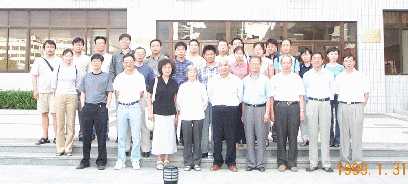by Meirong Zhang, Tsinghua University, Beijing
Peking University is one of the most influential universities in China. Many excellent people in its School of Mathematical Sciences were working on a variety of subjects of dynamical
systems and had a tremendous influence on the study of dynamical systems in China.
The late Professor Shantao Liao, Member of the Chinese Academy of
Sciences, began his systematical study on differentiable dynamical
systems in the late 1950s. In the early 1960s, he obtained a
theorem which is now called Oseledets's Multiplicative
Ergodic Theorem [1]; his formulation is in terms
of the associated systems on the bundles of frames, not completely the
same as the tangent systems in modern terminology. His work on this
subject is now widely recognized in the world. His main contribution
is on the Structural Stability Conjecture, which remained as the main
thesis of differentiable dynamical systems for a long time. He
systematically developed two important notions, namely Systems of
Standard Equations and Obstruction Sets, and then gave the first proof
of the Conjecture for the case of three-dimensional flows without
singularities. The approach developed by Liao is somewhat different
from those in the Western World, but also fruitful. His complete work
is available in English [4]. His research is
continued by his students, including Lan Wen, another Member of the
Chinese Academy of Sciences, Zhenxi Dong, Shaobo Gan, Wenxiang Sun
(all in Peking U.), and Chengbo Yue (Academia Sinica) and Meirong
Zhang (Tsinghua U.), with main interests in the
C1 Closing Lemma,
C1 Connecting Lemma,
C1 Stability Conjecture [6], C1 Density
Conjecture [7], rigidity and Anosov systems,
etcetera.
Professor Zhifen Zhang obtained her Ph.D. from Moscow State University
and from the start of the 1950s she was interested in the Qualitative
Theory of Differential Equations [8]. Since then
her group has been working on Bifurcation Theory and Normal
Forms. Their research on the weak Hilbert 16th Problem and bifurcation
problems (see for example [3]) has close
connections with many groups in North America and Europe, in
particular the United States, Russia, Belgium and Spain. Their results
are widely circulated in the world. Zhifen Zhang, Wenzhao Huang,
Chengzhi Li, Weigu Li, Duo Wang, Jiazhong Yang, Zhiming Zheng are in
Peking U., Lanyu Wang is in Academia Sinica and Yun Tang in Tsinghua
U.
Professor Min Qian is an expert in Probability Theory. He began his
study on dynamical systems in 1970s and has been involved in many
subjects of this interesting area. His group produced many important
results on ergodic theory, random dynamical systems,
infinite-dimensional systems, mathematical physics and their
applications [5]. Students of him and his
colleagues are now spread over many parts of the world, while some of
them, Peidong Liu, Guanxiang Wang and Zhengdong Wang, are still
working in Peking U.

Professor Tongren Ding and his students mainly work on nonlinear
oscillations and Hamiltonian systems. A remarkable contribution is on
KAM Theory for Hamiltonian and reversible systems and its applications
to ODEs and PDEs. Ding himself has systematically developed the
time-mapping approach and found their connections with the Moser Twist
Theorem [2]. He also has many interesting results
on some fundamental problems of dynamical systems, such as the
refinement of a construction of Birkhoff which resulted in finding an
analytical example of a system with the properties that it has a
2-torus as its minimal set and has no almost periodic motion at
all. His students, for example, Bin Liu (Peking U.), Rong Yuan
(Beijing Normal U.) and Zaihong Wang (Capital Normal U.), have been
working in Beijing, while many others are working elsewhere and have
important influences on their institutions. The recent work of Meirong
Zhang on the rotation number approach to eigenvalues and spectrum and
its applications to nonlinear oscillations is closely related to this
group.
Because of its history, and of its graduates from this group, the
dynamical systems group at Peking University has a long-standing
influence on the developments of dynamical systems in all of China and
in all important areas, including topological dynamical systems,
differentiable dynamical systems, Hamiltonian systems, and ergodic
theory. Peking University is the most important dynamical systems
center in China and has many connections with other parts of the
dynamical systems community in the world. The University has hosted
the 1996, 1998 and 2001 International Conference on Dynamical Systems
and Differential Equations. In recent years, there are international
dynamical systems conferences and some regular programs every year in
China. Some of them are jointly organized with the United States.
All international cooperation on dynamical systems and their
applications are welcome by the group.
References
| [1] |
L. Arnold, Random Dynamical Systems,
Springer-Verlag, Berlin, 1998. |
| [2] |
T. Ding,
R. Iannacci, and F. Zanolin, "Existence and multiplicity results for
periodic solutions of semilinear Duffing equations,"
J. Differential Equations105 (1993),
364-409. |
| [3] |
F. Dumortier, C. Li, and Z. Zhang, "Unfolding of a
quadratic integrable system with two centers and two unbounded
heteroclinic loops," J. Differential Equations 139
(1997), 146-193. |
| [4] |
S. Liao,
Qualitative Theory of Differentiable Dynamical Systems,
Science Press, Beijing, 1996. [English; translated from the
Chinese] |
| [5] |
P.-D. Liu
and M. Qian, Smooth Ergodic Theory of Random Dynamical
Systems, Lecture Notes Math. Vol. 1606, Springer-Verlag, Berlin,
1995. |
| [6] |
L. Wen,
"On the C1 stability conjecture for
flows," J. Differential Equations 129 (1996),
334-357. |
| [7] |
L. Wen,
"Homoclinic tangencies and dominated splittings,"
Nonlinearity 15 (2002), 1445-1469. |
| [8] |
Z. Zhang, T. Ding, W. Huang, and Z. Dong, Qualitative
Theory of Differential Equations, Transl. Math. Monographs
Vol. 101, Amer. Math. Soc., Providence, RI, 1992. [English; translated
from the Chinese by Anthony Wing Kwok Leung] |